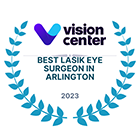
Keratoconus is an eye condition that results in the corneas becoming thinner than normal and cone-shaped. The vision may become blurred and distorted, and glasses and contact lenses can correct keratoconus in the beginning stages.
Keratoconus progresses fast in many cases. It's important to see a cornea specialist quickly for treatment. Early treatment is crucial.
Since vision loss is a possibility for those with keratoconus, LASIK surgery is often considered to reverse vision challenges. Despite this fact, many LASIK surgeons recommend that keratoconus patients avoid LASIK surgery, as the procedure could exacerbate the condition.
This is why each person must be carefully assessed to determine eligibility for LASIK. If you have been turned down for LASIK surgery in the past due to possible keratoconus, it might be beneficial to obtain a second opinion.
If you were told you can't have LASIK because of possible keratoconus, it's a good idea to get another doctor's opinion. At The LASIK center, Dr. Silk can accurately diagnose keratoconus, allowing more people to get LASIK after a correct diagnosis. Many individuals were previously misdiagnosed with this condition.
Understanding Keratoconus
Keratoconus is a degenerative disease of the corneas that causes several symptoms. The actual cause of keratoconus is unknown, but it is believed to be genetic or even environmental. In addition to blurred and distorted vision, additional symptoms caused by this eye disease include:
- Sensitivity to light, making night driving a challenge
- Progressively worsening eyesight that requires frequent eyeglass prescription upgrades
- Double vision
Individuals diagnosed with keratoconus or thin corneas are typically urged not to undergo LASIK, as it is contraindicated. The reason for this contraindication is that there is a chance that the surgery could remove an excessive amount of tissue from corneas that are already too thin.
Removing too much tissue from the cornea could lead to corneal estacia, a condition similar to keratoconus. Since not every individual with keratoconus exhibits the typical symptoms of the disease, it makes accurate diagnoses difficult, which significantly increases the chances of misdiagnosis.
The Role of Expert Evaluation
Dr. Silk takes his job seriously, and he wants to ensure that as many patients as possible can become eligible for LASIK. He welcomes those who have previously been diagnosed with or suspected of having keratoconus. Dr. Silk uses advanced tools and techniques to carefully assess corneal health and provide an accurate diagnosis. These advanced tools and techniques include:
- Computerized corneal mapping - otherwise known as corneal topography, this imaging technique is considered to be the gold standard in detecting even the most minute changes in the cornea. This makes it easy to confirm or correct a previous misdiagnosis.
- Curvature and elevation methods - These measurements will be used in conjunction with other tests to confirm or reverse a diagnosis.
- Biomechanics - This tool allows Dr. Silk to assess the corneas and determine how they react with the external forces.
Navigating Misdiagnoses
It's not uncommon for eye specialists to misdiagnose keratoconus because not only are its symptoms similar to other corneal diseases like pellucid marginal degeneration, but symptoms don't always present in a textbook manner.
For instance, a person can have corneas that have normal thickness but still suffer from the condition. Also, both eyes aren't always affected, and having steep corneas doesn't always indicate keratoconus.
This is why it's so difficult for eye specialists to definitively diagnose keratoconus. Dr. Silk has such an extensive background in making accurate keratoconus diagnoses that he performs meticulous evaluations focusing on various aspects of the eye and not merely thin corneas.
He uses a detailed checklist to ensure that he examines the eyes thoroughly, which helps him to diagnose or rule out keratoconus. Dr. Silk also takes an extensive medical history, which assists with the diagnosis process as well. The impact of a specialist expert evaluation can be life-changing, as it can help many patients who were previously deemed inappropriate for LASIK to become candidates for this vision-restoring surgery.
The Impact of Specialized LASIK Care
Having performed nearly 20,000 complex eye surgeries throughout his career, Dr. Silk has gained immense expertise in the field of ophthalmology. His specialized expertise allows him to identify a wider range of patients who are LASIK surgery candidates.
Individualized care is the key to Dr. Silk's success, as he specially tailors treatment plans to each patient's specific needs. By individualizing each plan, Dr. Silk can provide the specialized care that each patient needs, while making a wider array of treatments possible.
The Value of Second Opinions
An inaccurate diagnosis means that the proper treatment can't be sought, and keratoconus is often misdiagnosed. If you've been diagnosed with keratoconus, it's highly recommended that you should seek a second opinion from a cornea specialist like Dr. Silk. Even if you were told you can't have LASIK, Dr. Silk will check you carefully to give you the right diagnosis.
Once you're properly diagnosed, you might find that new possibilities for treatment open up after a previous diagnosis has been corrected. If you don't have keratoconus, LASIK can correct your vision without any risk of corneal issues.
Conclusion
Keratoconus is a degenerative eye disease that causes the corneas to thin and become cone-shaped. Patients with this condition typically can't undergo LASIK surgery, which could reverse the vision problems that this disease causes.
Doctors aren't always able to accurately diagnose it, making treating keratoconus a challenge. Dr. Silk has dedicated himself to providing specialized evaluations and treatment options for those once deemed unsuitable for LASIK.
Scheduling an appointment with Dr. Silk for a comprehensive consultation could completely transform your life, especially if he discovers that you are a LASIK surgery candidate.
If you need an eye doctor who specializes in performing LASIK, including for patients with keratoconus, contact the LASIK Vision Center. Our doctors are experts in LASIK and can help all patients, regardless of their condition.
Complete the 15-second LASIK self-test on our website to determine if you're a possible candidate for LASIK.











.png)

